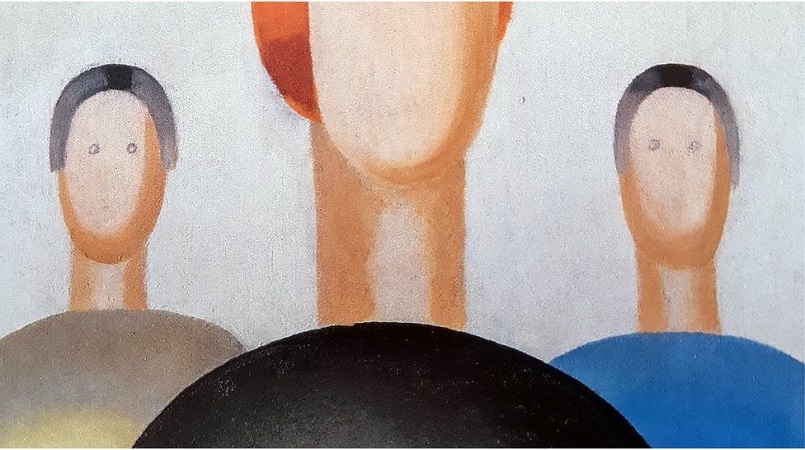
A Russian art gallery guard has been accused of doodling on a Soviet-era painting he was responsible for guarding on his first day in the job.
During a visit to the Yeltsin Center in Yekaterinburg in December, two visitors spotted eyes drawn in ballpoint pen on Anna Leporskaya's work Three Figures.
The avant-garde painting features three abstract, and usually eyeless, figures.
The security guard has since been fired and the police have opened a criminal investigation.
In a statement the Yeltsin Center's executive director Alexander Drozdov said the security guard was employed by a private security organisation.
It was also the security guard's first day in the job, exhibition curator Anna Reshetkina told Russian website ura.ru.
"His motives are still unknown but the administration believes it was some kind of a lapse in sanity," she said.
She added that he drew the eyes onto the painting with one of the Yeltsin Center's own branded pens, penetrating a layer of the paint.
Luckily, the culprit did not apply strong pressure to the canvas with the pen and as a result the damage did not go very deep, according to The Art Newspaper Russia which first broke the story.
But it added that the paint layer on the left-hand face in the painting had crumbled slightly.
The damage was first reported to police on 20 December, but the ministry of internal affairs initially declined to initiate a criminal investigation as the damage was deemed "insignificant".
But the ministry of culture later complained to the prosecutor general's office about the decision, and last week police opened an investigation.
If found guilty, the security guard suspected of the crime could face a fine and up to three months in prison.
The painting was returned to the State Tretyakov Gallery in Moscow, which had loaned the painting to the Yeltsin gallery, for restoration a day after the vandalism's discovery.
The restoration is estimated to cost 250,000 roubles (£2,468; $3,345).
Protective screens have since been installed over the other works in the Yeltsin Center's exhibition.
Leporskaya was a student of the famous artist Kazimir Malevich, who developed an avant-garde movement that took the art world by storm in the 1920s.
Leporskaya became famous for designing buildings and exhibitions as well as painting, and her works can be found in various museums across Russia.
The Yeltsin Center was named after Russia's first president Boris Yeltsin, who was in power from 1991 to 1999.
He oversaw the country's transition following the fall of the Soviet Union, and had to deal with various economic and political crises during his presidency.
By the time he left office Mr Yeltsin was widely unpopular in Russia and the museum built in his name has divided public opinion.
